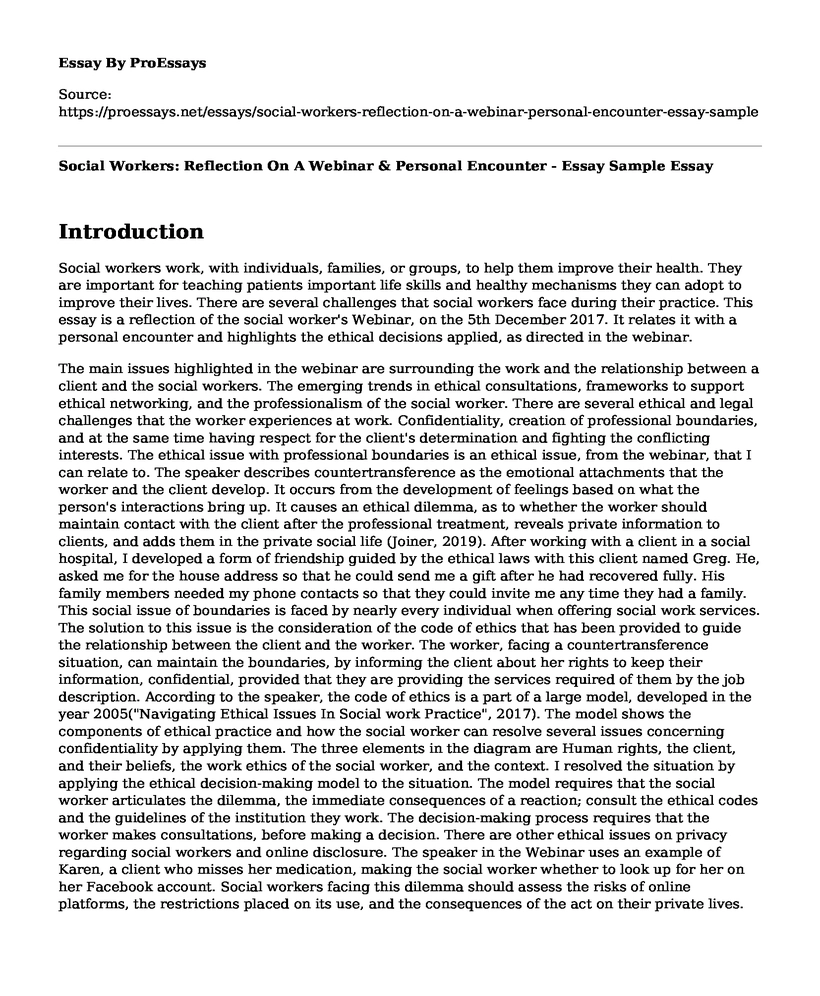Introduction
Social workers work, with individuals, families, or groups, to help them improve their health. They are important for teaching patients important life skills and healthy mechanisms they can adopt to improve their lives. There are several challenges that social workers face during their practice. This essay is a reflection of the social worker's Webinar, on the 5th December 2017. It relates it with a personal encounter and highlights the ethical decisions applied, as directed in the webinar.
The main issues highlighted in the webinar are surrounding the work and the relationship between a client and the social workers. The emerging trends in ethical consultations, frameworks to support ethical networking, and the professionalism of the social worker. There are several ethical and legal challenges that the worker experiences at work. Confidentiality, creation of professional boundaries, and at the same time having respect for the client's determination and fighting the conflicting interests. The ethical issue with professional boundaries is an ethical issue, from the webinar, that I can relate to. The speaker describes countertransference as the emotional attachments that the worker and the client develop. It occurs from the development of feelings based on what the person's interactions bring up. It causes an ethical dilemma, as to whether the worker should maintain contact with the client after the professional treatment, reveals private information to clients, and adds them in the private social life (Joiner, 2019). After working with a client in a social hospital, I developed a form of friendship guided by the ethical laws with this client named Greg. He, asked me for the house address so that he could send me a gift after he had recovered fully. His family members needed my phone contacts so that they could invite me any time they had a family. This social issue of boundaries is faced by nearly every individual when offering social work services. The solution to this issue is the consideration of the code of ethics that has been provided to guide the relationship between the client and the worker. The worker, facing a countertransference situation, can maintain the boundaries, by informing the client about her rights to keep their information, confidential, provided that they are providing the services required of them by the job description. According to the speaker, the code of ethics is a part of a large model, developed in the year 2005("Navigating Ethical Issues In Social work Practice", 2017). The model shows the components of ethical practice and how the social worker can resolve several issues concerning confidentiality by applying them. The three elements in the diagram are Human rights, the client, and their beliefs, the work ethics of the social worker, and the context. I resolved the situation by applying the ethical decision-making model to the situation. The model requires that the social worker articulates the dilemma, the immediate consequences of a reaction; consult the ethical codes and the guidelines of the institution they work. The decision-making process requires that the worker makes consultations, before making a decision. There are other ethical issues on privacy regarding social workers and online disclosure. The speaker in the Webinar uses an example of Karen, a client who misses her medication, making the social worker whether to look up for her on her Facebook account. Social workers facing this dilemma should assess the risks of online platforms, the restrictions placed on its use, and the consequences of the act on their private lives.
Conclusion
In conclusion, social workers are faced with several ethical dilemmas in their field of work. A major one is their chances of having their privacy disclosed and the growth of a mutual unprofessional relationship with clients. The absence of privacy can cause discomfort and can affect the daily lives of the workers. Workers facing the issue should always consider the ethic codes and consult various guidelines and the cultural set-ups before engaging in any further activities, not listed as part of the profession.
References
Navigating Ethical Issues in Social work Practice. YouTube. (2017). Retrieved 27 May 2020, from https://www.youtube.com/watch?v=XVQl_B92Lp4.
Joiner, J. M. (2019). Digital Ethics in Social Work Education. Journal of Teaching in Social Work, 39(4-5), 361-373. https://www.tandfonline.com/doi/abs/10.1080/08841233.2019.1654590
Cite this page
Social Workers: Reflection On A Webinar & Personal Encounter - Essay Sample. (2023, Aug 09). Retrieved from https://proessays.net/essays/social-workers-reflection-on-a-webinar-personal-encounter-essay-sample
If you are the original author of this essay and no longer wish to have it published on the ProEssays website, please click below to request its removal:
- Medicaid Database in Texas
- The LGBT Population and HIV/AIDS Infection Paper Example
- Evidence-Based Medicine in Depression Essay Example
- Trinity Community Hospital's Risk Assessment Paper Example
- NHS Smoke-Free Health Harm Campaign: Unfavorable Health Effects of Tobacco - Essay Sample
- Research Paper Sample on Ventilator-Associated Pneumonia
- Assessing Resilience in Dyslexic Individuals - Essay Sample







